Slaying the MCAT Part 1 - MCAT Basics
- Kyeisha Laurence
- Oct 18, 2021
- 10 min read

The MCAT is hard and the MCAT is important. If you’re a pre-med student there’s a good chance you know the ad I’m referring too! The statement is true though, the MCAT is like the first true step you take towards your application to medical school. This exam was hands down the hardest exam I have ever studied for - but once I was done with it I felt immense pride and excitement to know I overcame this HUGE step and all that was left between me and medical school was the application!
Studying for the MCAT is a big topic to cover, afterall there are tutors and test prep companies that commit all their time to helping students prepare for this exam. My goal with this guide is to tell my MCAT story and help anyone who is preparing for this exam. As a first-generation college student and first in my family to apply to medical school, it was challenging to tackle this exam on my own. But I learned I am not alone - there are so many fellow students on their journey who are willing to help, family and friends I could lean on, fellow bloggers/youtubers/forums, and I hope that I can pass on this support and information to the next student who needs it! At the end of the day, I couldn’t do this on my own and you don’t have to either!
Without further ado, let’s dive into how I was able to slay the MCAT with grace and faith!
Xoxo,
Kye
Part 1 - The Basis
One of the first steps to getting ready to take the MCAT is to understand what the MCAT is all about. If you’re getting ready to start studying for the MCAT, then doing some research into how other people have studied for the exam is a great start. I started by watching Youtube videos and reading blogs like this one to get some insight into how people approached the exam.
The MCAT can feel like a huge hurdle but by knowing that others were able to conquer it - it made me feel like I could do it too! At this point, I believe getting as much information as possible is helpful (later in your study journey too many opinions/ways to study could be counterproductive). At the start it’s great to learn about the choices you have for test prep companies, how much time you should plan to study, how much money you should budget, and more.
In this first part of the blog I’ll talk about how I went about this.
What really is the MCAT?
What really is the MCAT? What does it entail? What is being tested? As a pre-med student, I heard about the MCAT since my first year of college, but all I really knew was that it was a 7 hour exam that was needed for medical school. It wasn’t until I was getting ready to study that I learned that the exam consist of four sections:
Chemical and Physical Foundations of Biological Systems
Critical Analysis and Reasoning Skills
Biological and Biochemical Foundations of Living Systems
Psychological, Social, and Biological Foundations of Behavior
For the rest of this guide, I may refer to each section by some nicknames. Chemical and Physical Foundations is Chem/Phys. Critical Analysis and Reasoning Skills is CARS, the biology section is Bio/Biochem, and the final section is Psych/Socy.
Each section is 95 minutes with 59 questions each except for CARS which has 53 questions. For each section, there are multiple concepts that the AAMC can test you on - many of these are concepts you would have learned in your pre-medical classes such as the chemistries, biochemistry, molecular/cellular biology classes and physiology class, and psychology and sociology. I’ll talk in a later section about which classes I found helpful for the MCAT.
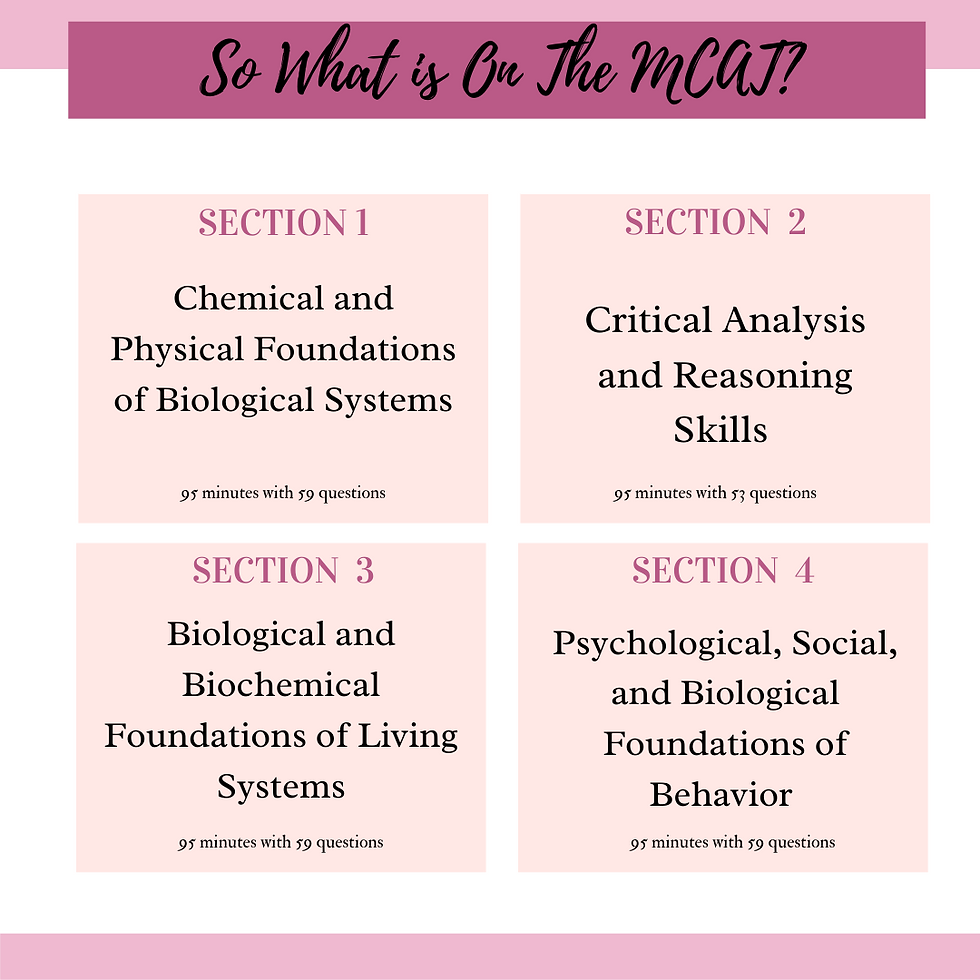
Here is what I did to learn what exactly will be tested on the MCAT:
Head to aamc.com/mcat and I suggest downloading the “MCAT Essentials” document and read through this to get an idea about what the exam is like and logistics of taking it
Next, you can read all the content on the exam here. Warning if this is really overwhelming to me to see all this material I had to learn - I felt the same way! Don’t worry! Part of MCAT studying is taking all of this content step by step.
I made a google drive folder for MCAT studying and made folders for each section of the exam and uploaded the content breakdowns here.
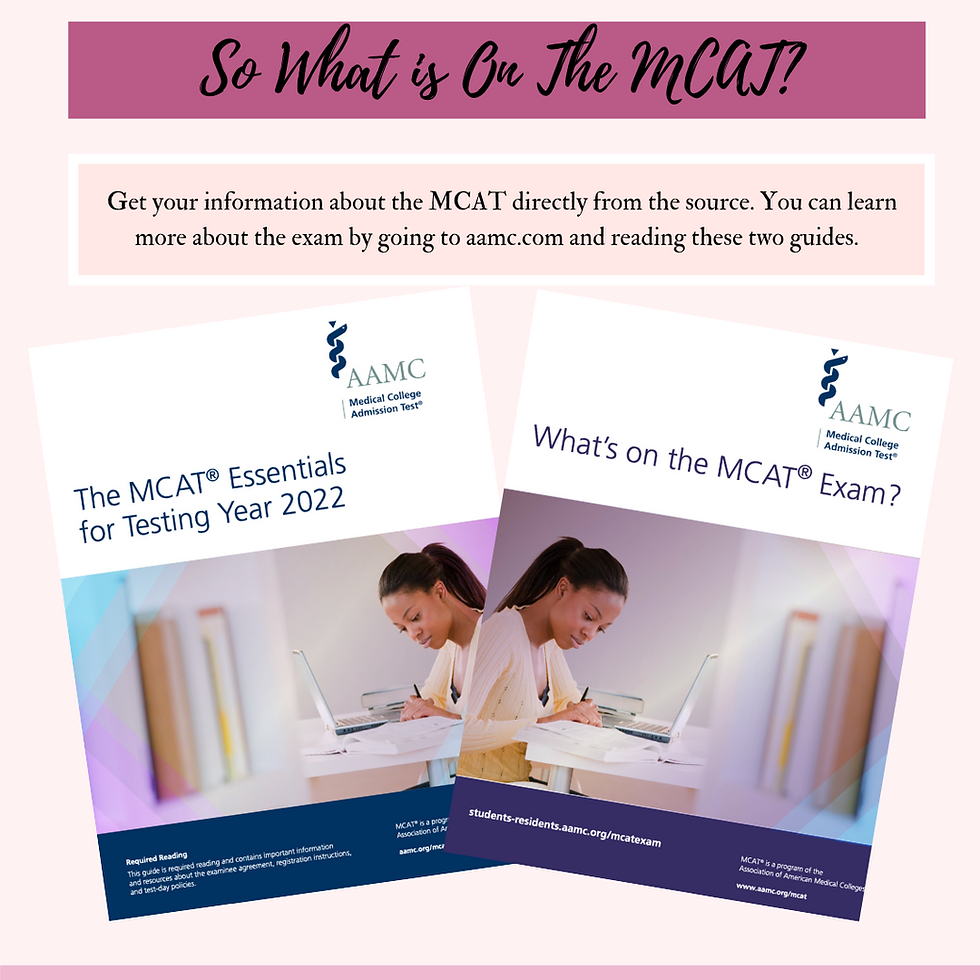

Knowing what is on the MCAT is a great first step to getting ready for the exam. The next thing I did was to begin to form an outline of my study plan, so let’s talk about timing next!
When to take the MCAT
In order to apply to medical school, you will need to submit your MCAT score so when you will take the MCAT will depend on when you want to apply to medical school and when you will have the time and resources to be able to study for the exam.
One concept that causes a lot of confusion and is important to note is that we apply to medical school ONE YEAR before the year we will start medical school. I am applying this summer (May 2021) after my senior year which means that I will be going to medical school in 2022, this means there is one year between me submitting my application and starting school - what is known as the “gap year”
Since I knew I was taking a gap year I knew I would take my MCAT in my senior year - however if I wanted to go to medical school directly after graduating medical school I would have had to take the exam in my junior year.
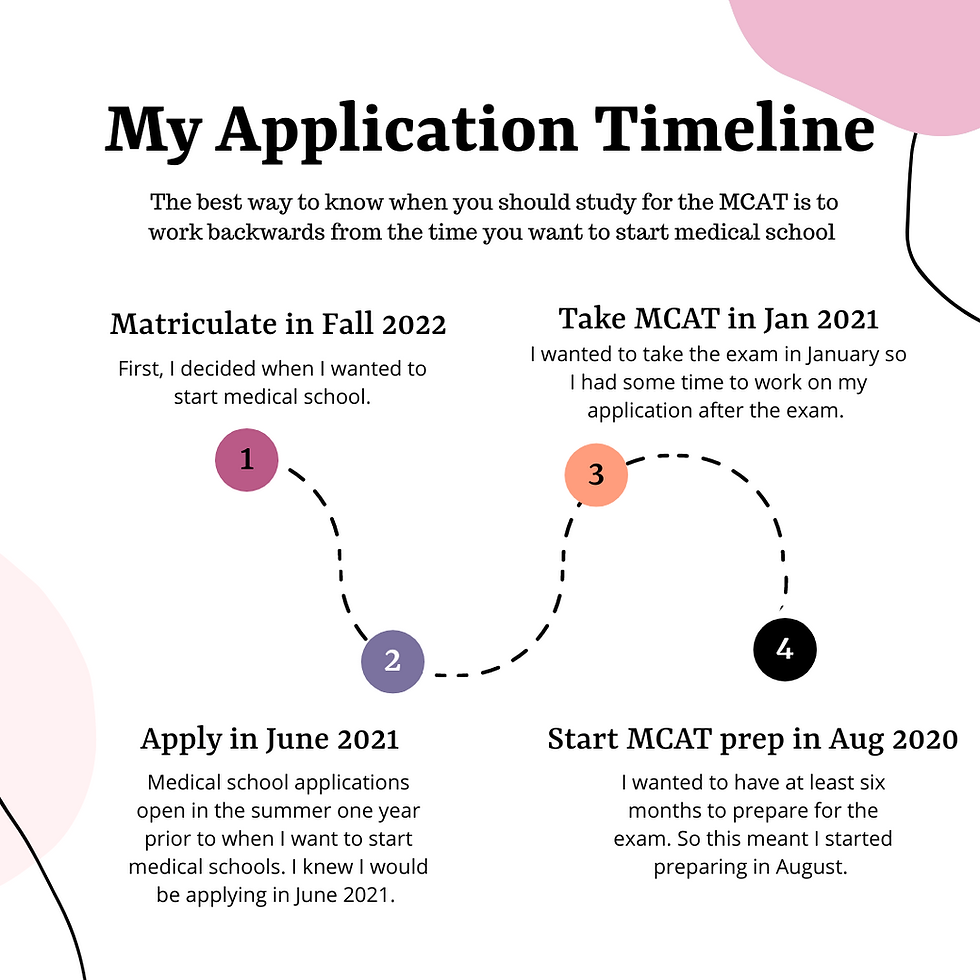
I decided I would take my exam in January 2021 - some aspects I took into account when choosing this date was that I would be able to use winter break to study. I also wanted to make sure I had enough time to retake the exam if needed. When deciding on my course schedule for senior year I also had to keep the MCAT in mind, in order to have time to study I decided to take Mammalian Physiology over the summer which would give me some of my summer to start content review and made my fall semester 15 credits rather than 19 credits. In contrast my spring semester now is 20 credits and I knew I couldn’t handle that and MCAT studying too - so this really pushed me to be able to take it in January.
As you can tell, when to take the MCAT is totally personal and will depend on your four year plan, whether you plan to take a gap year(s), and when you will have the time to study for it.
Studying for the MCAT during the semester is very difficult so I suggest taking it after summer or winter break so you can use your break for the most intense part of your studying.
Once I had an idea of when I would take the exam, I wanted to have at least six months to be able to study. I chose 6 months since I knew most of those months I would be studying along with handling my classes, leadership roles, jobs, etc and so I probably could do 5-7 hours of MCAT studying a week. If you are able to have 10-15 hours a week for example, then you might be able to study in less months.
Six months also seemed like the average time people studied for the exam. For a January exam, this meant I would start studying in August - this was exactly after I finished my summer course so it worked out well for me.
Ok, so that was a lot but just wanted to explain the various factors included to find out when you should take the MCAT. Of course, work with your pre-health advisor to find which time would be best for you.
Now that I had my exam date and broad timeline of studying in mind, my next step was to read over guides on how people broke down those months to tackle the exam and craft a study plan for myself!
Forming a Study Plan
One of the resources I used to form a study plan was this article from Kaplan. Now, looking back this is not the exact schedule I ended up following but it was really helpful to have this overall guideline of how I wanted to study and approach this exam. Here is what I planned to do and on the following page I will talk about what I actually did.
Tip: Don’t spend too much time on this step. As you go on with your study plan, things will change!
My Proposed Plan:

This plan was pretty reasonable and as you can tell it was very general. This was enough for me to map out very broadly how I would study for the exam. I then created more specific plans of how I would get through all the content, do my practice exams, and so on.
One thing I did that I really recommend is doing the full length exams throughout the study process - this helped me to get used to the timing and stamina needed to take the exam. While I didn’t get close to my goal score until the final month before the exam - all those months of practice did help me be able to improve my score once it was crunch time!
So this was my proposed plan, but with everything in life...things did not go exactly to plan. Here is what my actual MCAT study plan looked like:

As you can tell….everything didn’t really go to plan! Trying to study throughout the semester was a HUGE challenge for me. I thought by January I would have been near my goal score and just focusing on my key weaknesses, but instead I was still taking full length exams and improving my score in all four areas. This is why I suggest, if you are a full time student, picking an MCAT date where you have a summer or winter break before your exam to study.
Another lesson from my MCAT studying is to integrate practice problems early and often throughout your study plan. I thought of MCAT studying as these phases, first you do content review, then you do practice questions, and then full length exams. But honestly I think integrating practice problems throughout your studying is important for several reasons:
By the time you start doing practice questions you might forget the content you studied
It allows you to get used to the type of questions on the MCAT
You work on key skills such as how to think critically and answer questions WITHOUT knowing the content! This turns out to be a HUGE part of taking the MCAT, sometimes you can answer a question just by reading the passage carefully and thinking critically.
Turning Your Study Plan Into A Schedule
To determine my day to day study plan, I made my schedules using excel templates. I have my templates linked on my blog that you can check out. Simply go to stylebykye.com/mcat.
Let's start with how I planned out my content review. I used this template here and set the chapters I would do for each day. You'll notice that I also included the practice material I would do and I had it color-coded. At this time I was also studying for my 6-week intensive Mammalian Physiology Course so you'll notice that some days I was unable to do any MCAT studying and I marked these with a red color.
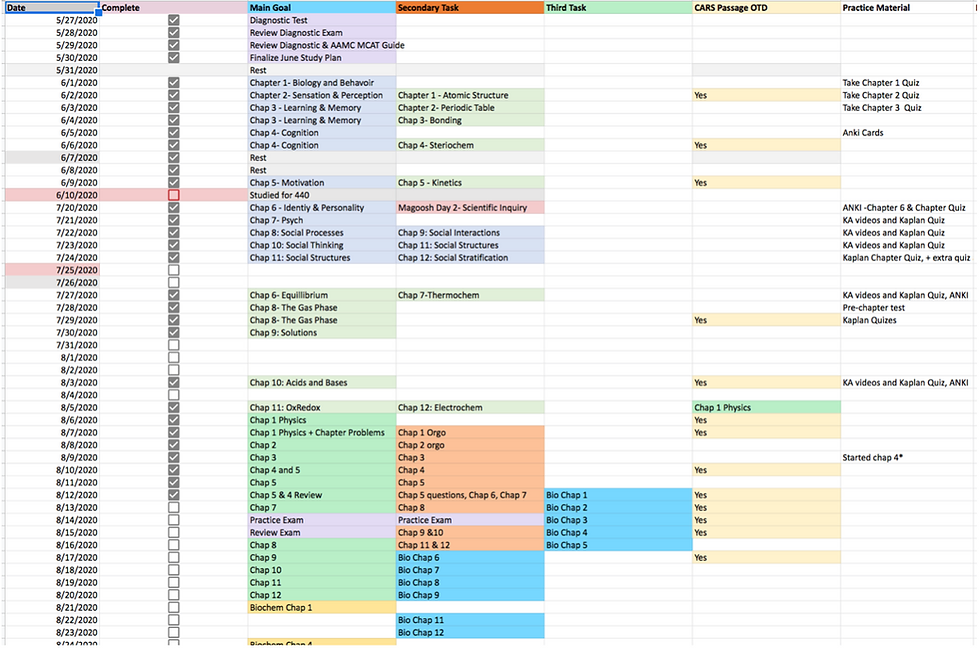
I would match my study plan to my google calendar to determine what time I would spend doing each task:
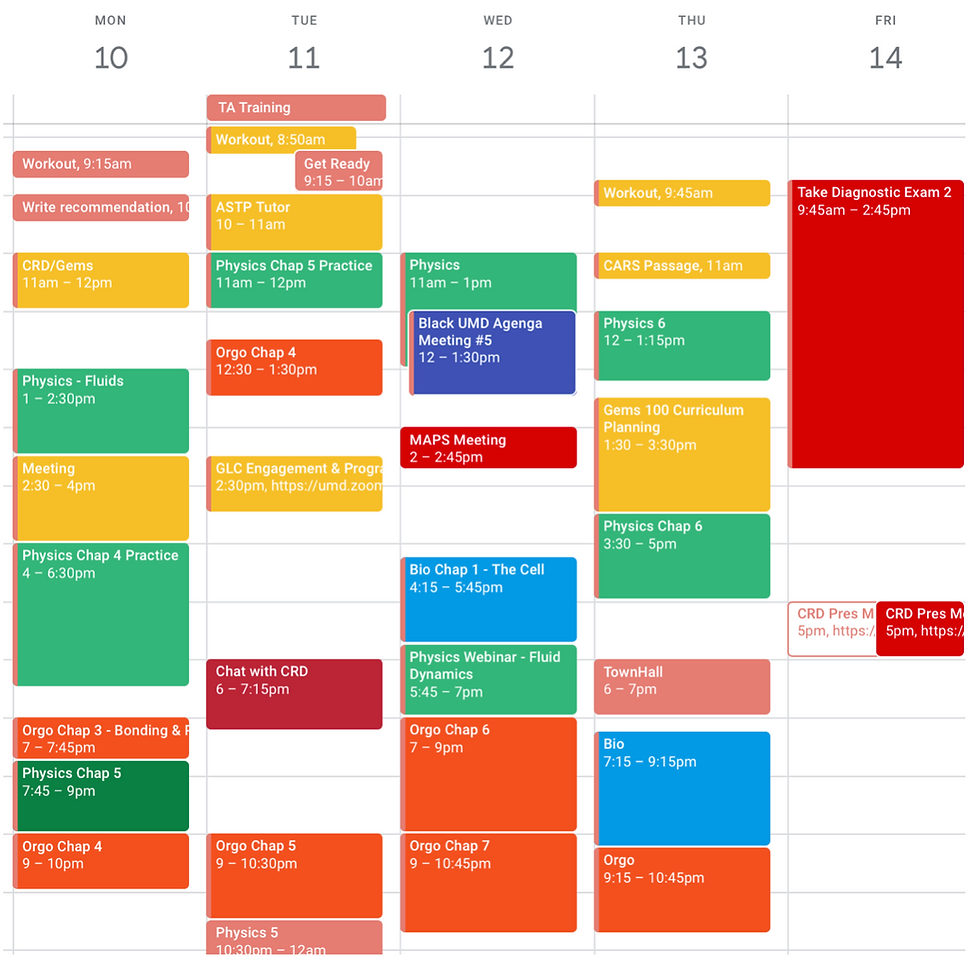
This worked well for content review but when I started switching from content review to more practice problems I used another study template. This template is from May Gao. I liked this set up because I could schedule which practice problems I would do for each section of the MCAT:
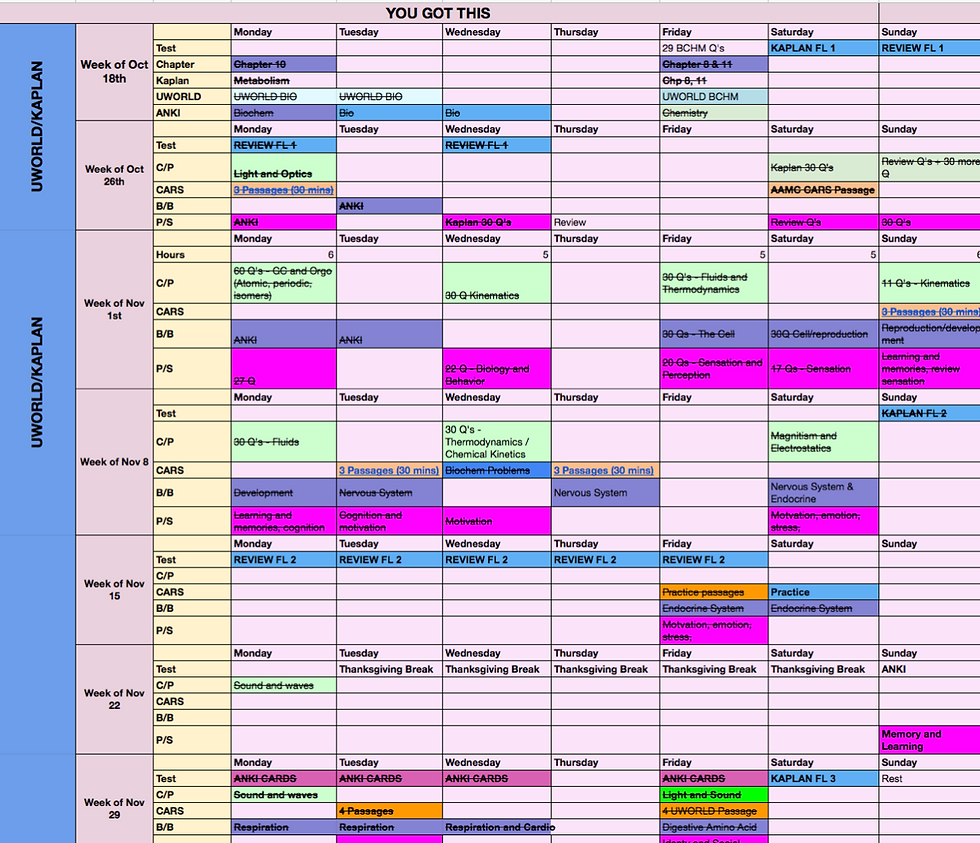
As you can see, this template is broken up by the week and it allowed me to have a tasks for each subject (C/P, CARS, B/B, P/S).
Here is a look at my schedule once I was doing MCAT studying full time leading up to my exam. I reformatted my study excel just a bit to accommodate my busier study schedule. As you can see, at this point my studying was very intense and so I have each subject horizontal on the top and was studying a topic for the subject each day.
Full length exams took all day, as you can see indicated on the study plan. I also took a full day to review my exams. I'll talk more about how to review your full lengths in the next blog post.

My overall tips for formatting your study plan is to stay organized, stay on top of it, and take the time to find out what works best for you! Probably the most indimidating thing about the MCAT is the shear amount of knowledge you need to review to do well on the exam and this makes it challenging to know how to schedule in your review of these various topics. Give yourself plenty of time to study and stay on top of you study plan, this means you should constantly be refining it as you find out what works best for you and which topics you need more time to review.
MCAT Resources
As we come to the end of this blog post, I wanted to share resources I found helpful when studying for the MCAT. Some of these have been linked throughout the blog as well.
MCAT Resources to Buy That I Used:
*Free if you have AAMC Fee Assistance. Find out more here.
I used their books, Qbank, and practice exams.
I used their full length practice exams, they also have a free full length and free diagnostic!
Used for their great question bank and explanations
I hope that this blog post was helpful for those who are starting to study for the MCAT or planning ahead to take it in the future. Everyone's MCAT journey will look different but it really helped me to read blogs and watch videos to understand how other students tackled this exam. I am excited to give more MCAT tips in my next blog post.
If you're registered for the exam, leave a comment of when you plan to take it! I truly wish you the best of luck!
If you have a specific question about MCAT prep, please email me at stylebykye.contact@gmail.com and I'd be happy to chat with you.
xoxo,
Kye

Comments